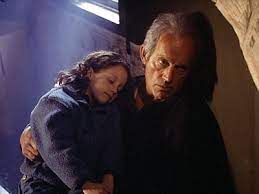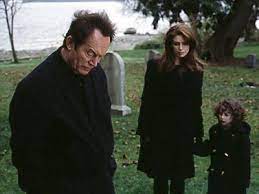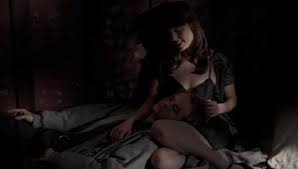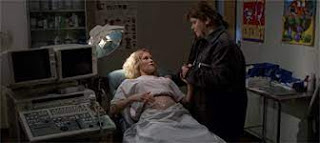Directed by Thomas J. Wright
Written by Glen Morgan and James Wong
Air Date: May 15, 1998
Guest Star: Glenn Morshower (Richard Gilbert)
With the Marburg Virus spreading and Frank's suspicions about the Millennium Group at a breaking point, the final episode of Season 2 ends on a shocking and grim note.
Frank continues to waffle about staying in the group. His confusion increases after Peter accurately predicted an earthquake that struck the Seattle area. As Frank continues to consider joining The Trust, he learns his contact Richard Gilbert (Morshower) was murdered by the Millennium Group. Peter also reveals to Frank the Group has a vaccine for the virus it keeps only for members.
In another memorable sequence, a psychedelic montage of end times imagery set to Patti Smith's Horses, Lara's newfound knowledge after joining the group has caused her to have a nervous breakdown. Later at a hospital, she and Frank share a final moment. He thanks Lara for being the only group member who understood him.
Frank decides to flee to his late father's cabin in the woods with Catherine and Jordan to avoid the virus. Frank tells Catherine he's been vaccinated and has one dose left which Catherine tells him to administer to Jordan. Later in the night Catherine comes down with the virus and dies. Final images from the episode reveal Frank with grey hair and in a prolonged trance of grief. A collage of sounds of society coming apart set to "In the Year 2525" ends the episode.
It should be pointed out Glen Morgan and James Wong were under the impression the series was ending, but it was eventually renewed at the last minute for the 1998-99 Fox season. The stark finality of the ending is both dramatic and frustrating. There were many loose ends, but it was quite a ride.
The contrast between seasons 1 and 2 are also what makes Millennium compelling. Henriksen observed on the DVD retrospective, season 2 took on a more of a fairy tale and ethereal quality. There were many memorable episodes and Frank's character evolved through the season - the main line being his eventual estrangement from the group.
As I said at the start of this blog, revisiting Millennium provides an incredible view into the mindset of of the late 1990s - and the first part quarter of the 21st Century. All the issues Millennium dealt with including cultish mentalities, strange cultural obsessions, anxiety about technology, the evil and tension lurking below the surface of everything continue to stay relevant. The light and darkness from within the Frank Black make the character both prophetic and reassuring.





